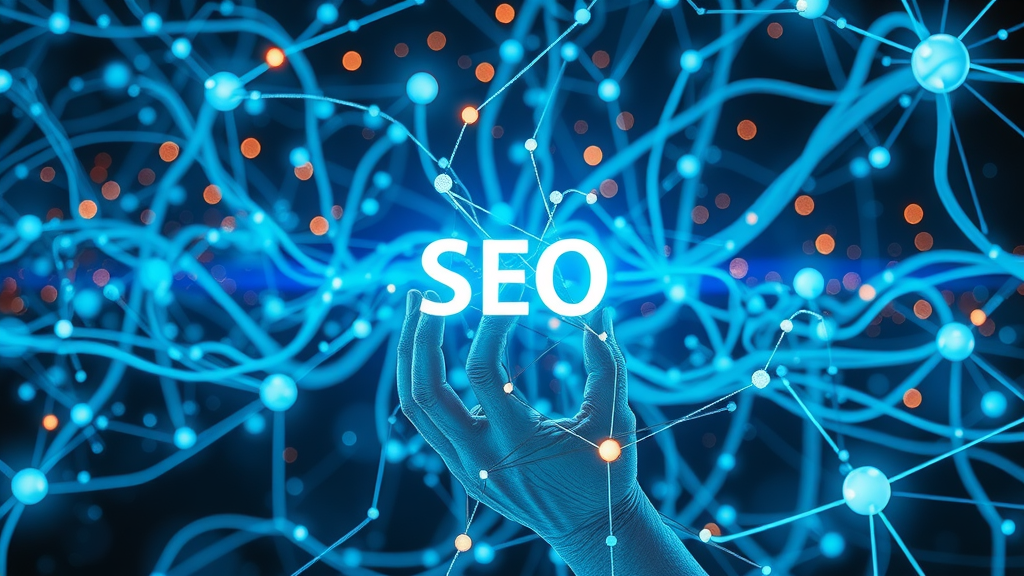Did you know? "Recent studies show that websites using AI SEO services increase their top-10 Google rankings 3x faster than competitors using traditional SEO strategies." If you want your site to leap ahead of the competition, it’s time to explore what an AI SEO agency can do for your rankings—and your business as a whole. In this guide, you’ll discover how the right AI-driven partner can take your SEO results to the next level with smart automation, advanced AI search, and cutting-edge language models.
AI SEO Agency: Revolutionizing Search Engine Optimization
Forget everything you thought you knew about SEO agencies. With the advent of powerful AI SEO agency solutions, the rules of digital marketing are being rewritten. AI search, generative engine optimization, and large language models are fueling faster ranking increases, smarter content strategies, and more precise technical SEO improvements. By automating crucial tasks and using predictive analytics, an AI SEO agency outpaces traditional methods—delivering scalable, cost-effective results that keep your business competitive in ever-changing search landscapes.
Clients are seeing measurable results: rankings that climb in weeks instead of months, technical SEO issues resolved instantly, and content strategies that adapt in real-time. Best of all, your business harnesses the combined power of human expertise and advanced AI tools, including generative AI and large language models, for holistic seo optimization. If you’ve ever wondered how to make your SEO strategy future-proof, an AI SEO agency is the answer you’ve been searching for.

"Recent studies show that websites using AI SEO services increase their top-10 Google rankings 3x faster than competitors using traditional SEO strategies."
What You'll Learn in This Guide to AI SEO Agency Solutions
The fundamentals of an AI SEO agency
How ai seo and ai search transform SEO strategies
The advantages of using ai seo services over traditional seo agencies
Where large language models and generative ai fit into your seo strategy
Actionable steps for engaging an ai seo agency for your business
Understanding AI SEO Agency: Definition & Core Capabilities
What Is an AI SEO Agency? Exploring AI SEO and AI Tools
An AI SEO agency is a specialized SEO agency that leverages the latest in artificial intelligence, ai tools, and large language models to power every aspect of search engine optimization. Unlike traditional seo agencies that rely mostly on manual techniques and slow workflows, an AI SEO agency uses advanced machine learning, AI search predictions, and generative AI for smarter, data-driven decisions. These agencies deploy advanced platforms that identify ranking opportunities, automate technical SEO audits, and constantly monitor search result shifts—all while optimizing your content using AI-powered algorithms.
The main advantage? Speed and accuracy. AI-driven agencies rapidly process vast amounts of data, discover keyword trends, and pinpoint areas for improvement in real time. By integrating cutting-edge ai tools, such as natural language models and predictive analytics, they craft strategies that are always one step ahead of shifting search engine algorithms. If you want an SEO partner who delivers unmatched efficiency and measurable ROI, an AI SEO agency sets a new standard for search engine optimization.
For businesses interested in how AI-driven marketing and automation can be integrated into their broader digital strategy, exploring the capabilities of a dedicated AI marketing and automation agency can provide valuable perspective on the full spectrum of AI-powered solutions available today.

How AI SEO Leverages Large Language Models and Generative AI
Modern SEO has evolved far beyond simple keyword optimization. Today, AI SEO agencies utilize large language models (like GPT-4 and beyond) and generative AI to understand the nuances of search intent and create highly relevant, quality content at scale. These advanced AI models can analyze millions of search results, identify emerging trends, and automatically adapt your SEO strategy to fit evolving ranking signals from search engines.
Generative AI tools actively write, edit, and optimize content to match the semantic context of target keywords. Meanwhile, language models ensure your website aligns with what search engines value most: expertise, authority, and trust. This radical shift allows businesses to create personalized, high-ranking content faster—and with a higher degree of relevance for their target audience. By deploying large language models and generative AI, your SEO optimization becomes proactive, not just reactive, helping you lead rather than follow in your market.
Key Differences Between an AI SEO Agency and Traditional SEO Agencies
The classical SEO agency approach is being disrupted. Traditional SEO agencies often rely on manual audits, periodic reporting, and one-size-fits-all strategies. In contrast, an AI SEO agency uses dynamic AI-powered systems for continuous optimization, comprehensive competitor analysis, and instant action on new SEO opportunities. Predictive analytics, automation, and enhanced data processing result in strategies that outpace legacy methods—leading to more robust results at a lower overall cost.
Additionally, AI tools can adapt instantly to algorithm updates, monitor the competitive landscape in real-time, and offer instant recommendations—an impossible feat for agencies relying solely on human effort. In short, an AI SEO agency replaces guesswork with precision, allowing your SEO strategy to thrive in a high-speed, data-driven digital marketing environment.
Comparison Table: AI SEO Agency vs Traditional SEO Agency |
||
Factor |
AI SEO Agency |
Traditional SEO Agency |
|---|---|---|
Speed |
Real-time analysis & instant updates |
Manual reviews—weeks to react |
Accuracy |
AI-powered precision based on big data |
Dependent on expert judgment & periodic data |
Cost |
Lower due to automation and efficiency |
Higher due to manual labor and time investment |
Results |
Faster, measurable, and scalable outcomes |
Slower, less predictable improvements |
AI SEO Services Explained: Core Solutions Driving Success
Generative AI & AI Search—Expanding Beyond Conventional SEO Services
AI SEO agencies revolutionize standard seo services by harnessing generative AI and advanced AI search technologies, extending far beyond what traditional SEO experts can offer. With generative AI, agencies can rapidly produce optimized, on-brand content at scale—meeting the demands of search engines and user intent. This means you’re never left scrambling to create content in response to changing trends; your site is always up-to-date and aligned with the latest best practices.
AI-powered search also transforms how agencies perform keyword research and intent analysis, continuously surfacing new opportunities and targeting highly specific, high-converting search queries. This results in improved rankings not only for main keywords but for a wide ecosystem of long-tail search terms relevant to your business. Ultimately, the best ai seo agencies offer the technical power and strategic intelligence to keep your site at the forefront of the digital landscape.
AI Tools and Their Role in Modern SEO Strategy
AI tools serve as the backbone of any successful AI SEO agency, powering everything from technical audits to ongoing performance monitoring. They automate labor-intensive tasks such as competitor tracking, backlink analysis, and site health checks. Instead of waiting for periodic reviews, AI systems alert your team instantly to changes in search algorithm behavior, new ranking challenges, or content optimization opportunities.
These AI tools also deliver deep, actionable insights that help shape your SEO strategy. By integrating data from multiple sources, they provide a holistic view of your digital marketing landscape—pinpointing where to adjust content, invest in technical SEO, or pivot keyword targets. Only an AI SEO agency has access to this suite of sophisticated machine learning, language models, and automation capabilities to guarantee your SEO strategies are always one step ahead.
How Large Language Models Power AI SEO Services
Large language models give AI SEO agencies a unique competitive edge. These advanced AI platforms analyze search trends, user behavior, and semantic content gaps to inform an overarching seo strategy. They interpret billions of data points at scale, create topic clusters for better content mapping, and ensure your website provides the most relevant answers to user queries—promoting higher placement in search results.
Whether it's optimizing website structure, providing AI-driven content recommendations, or conducting predictive topic research, large language models allow AI SEO agencies to deliver personalized and highly effective SEO services. Businesses gain the ability to respond to the ever-shifting landscape of search engines, capitalizing on new ranking opportunities instantly and at scale.

AI-Driven Technical SEO and Engine Optimization
Technical SEO forms the foundation of any successful optimization plan. It’s where AI SEO agencies shine, catching errors, optimizing site speed, and organizing architecture in ways regular teams can’t. AI-driven engine optimization monitors your site continuously, automatically adjusting for the fastest crawl rates, improved link structures, and clean code—all critical for higher search rankings.
Automated technical SEO checks mean fewer missed opportunities and less manual work for you. AI SEO agencies proactively fix indexing issues, resolve page errors, and adapt your website in line with the latest search engine changes. This all leads to more consistent, higher search rankings and a site ready to capitalize on every search opportunity.
Improving Search Results and Search Engine Optimization with AI
AI SEO agencies are all about results: better rankings, smarter content, and increased web traffic. By pairing data-driven AI platforms with technical SEO best practices, your business gets a comprehensive solution for sustained success. From instant audit recommendations to search-result-optimized content, AI SEO services convert technical improvements into real-world performance gains.
With AI continuously learning from your site analytics and competitor moves, you always stay on top of the evolving demands of search engines. Maximizing search result visibility becomes a strategic, automated process—empowering your business to dominate search engine rankings today and tomorrow.
Watch our explainer video to see how an AI SEO agency takes charge of data analysis, real-time optimization, and content production in a modern digital agency setting. Experience the future of SEO in minutes!
Why Choose an AI SEO Agency Over SEO Agencies Using Traditional Methods?
ROI and Measurable Benefits of Working with an AI SEO Agency
The core advantage of partnering with an AI SEO agency is measurable ROI. With automation, predictive analytics, and real-time decision making, clients benefit from scalable SEO strategies that drive faster ranking increases and long-term growth. The efficiency gains from AI platforms translate directly to lower costs and higher output, enabling your marketing spend to deliver more results per dollar.
Thanks to AI’s ability to process and act on massive datasets, your SEO strategy is never outdated. You’ll see clear performance metrics: improved search engine rankings, greater organic traffic, and consistent growth in conversion rates—all powered by the most advanced AI tools and large language models available.
Cost Savings from Automation & Scalable SEO Solutions
Automation is a game-changer—AI SEO agencies automate routine SEO audits, monitoring, and content creation, eliminating manual labor and reducing reliance on expensive one-off projects. These cost savings mean more budget for high-impact areas like content marketing, strategic link building, and advanced technical initiatives.
As your business grows, so does your SEO strategy—without ballooning costs. AI tools scale optimization efforts across hundreds or thousands of web pages simultaneously, providing rapid expansion while maintaining high accuracy. That’s the power—and cost efficiency—of choosing an AI SEO agency over a legacy provider.
"Our clients see results 42% faster on average after switching to an AI SEO agency for their SEO strategy."
How SEO Agencies Are Adapting to Generative Engine Optimization
Leading SEO agencies are quickly reshaping their own offerings to keep up with the rise of generative engine optimization. Many now incorporate AI-powered technical SEO checks, automated competitor monitoring, and value-driven content development using large language models. This evolution ensures their clients don’t fall behind as AI continues to advance—not just in keyword research or content creation, but in every aspect of SEO strategy and ongoing site optimization.
Stay ahead by partnering with an agency already fluent in generative AI and proactive, data-driven decision making. The right AI SEO agency is your direct route to future-ready, scalable growth and industry leadership.
List: Top AI SEO Agency Features & AI SEO Services You Can’t Miss
Automated keyword research and intent analysis using AI search
Real-time competitor monitoring with large language models
Content generation powered by generative AI tools
Predictive analytics for technical SEO improvements
Dynamic SEO strategy updates based on search results data
Real-World Results: AI SEO Case Studies Demonstrating Ranking Breakthroughs

Case Study Table: AI SEO Agency Success Stories |
|||
Industry |
AI SEO Agency Approach |
Performance Metrics |
Outcomes |
|---|---|---|---|
eCommerce |
Automated keyword targeting, dynamic product content updates |
+58% organic traffic, 4x faster ranking |
Page 1 for 12 competitive terms in 3 months |
B2B SaaS |
Technical SEO health monitoring, predictive analytics |
42% bounce rate reduction, 3x increase in leads |
Top 5 for mission-critical keywords in 6 weeks |
Healthcare |
Content strategy overhaul using generative AI |
3x increase in traffic from informational queries |
First page visibility on 32 new keywords |
Integrating an AI SEO Agency Into Your Marketing Workflow
Step-by-Step: Engaging AI SEO Services & Onboarding with an AI SEO Agency
Initial consultation: Identifying SEO opportunities
Selecting AI tools: Tailored to your business needs
Setting measurable goals: For AI-powered SEO strategies
Continuous optimization: Search result monitoring using generative engine tools
Bringing an AI SEO agency on board begins with a deep-dive seo audit and collaborative goal-setting. Expert teams recommend a custom stack of AI tools—from language model-based content engines to automated competitor trackers—to match your unique business objectives. Each stage of the process is transparent, focusing on measurable targets and reporting to ensure results are always clear and actionable. As your strategy unfolds, continual optimization and data-driven decision-making cement your site’s growing authority and search engine performance.
This partnership ensures you benefit from tailored recommendations that continuously evolve with search algorithm changes. Integration is seamless, with the agency’s AI platforms blending effortlessly into your marketing workflow, keeping your SEO strategy as dynamic and efficient as possible.
See what a typical day looks like inside an AI SEO agency: from instant data analysis to real-time content updates, watch AI and human experts work side-by-side for unmatched SEO performance.
The Future Is Now: Generative Engine Optimization and Large Language Models in SEO
How Large Language Models and Generative AI Reshape Search Results
Generative engine optimization is the future of SEO, fueled by large language models and cutting-edge generative AI. These technologies can analyze and understand the structure, meaning, and intentions behind search queries and web content at a human-like level. The result? AI-powered platforms that not only adapt to but anticipate major search engine algorithm updates.
With large language models, your SEO agency crafts content and optimization strategies that closely mirror user expectations and search engine preferences. As a result, your web pages align perfectly with what both people and search platforms are seeking—delivering higher rankings and improved user engagement on every search result.

Combining AI SEO Agency Tactics with Next-Gen AI Tools
The most successful businesses combine foundational AI SEO tactics with the latest generation of AI tools. Whether through machine learning-powered content updates, advanced technical SEO adjustments, or multi-source keyword analytics, the combined effect delivers breakthrough ranking gains.
AI SEO agencies help you integrate these next-gen tools seamlessly, so you never fall behind as the digital landscape transforms. This layered approach keeps your SEO strategy robust, resilient, and ready for whatever changes the future of online search brings.
People Also Ask: What is an SEO AI agent?
Answer: An SEO AI agent is an autonomous software powered by generative AI and large language models, designed to execute SEO tasks, optimize content, and monitor search engine algorithm changes with minimal human intervention.
People Also Ask: Can SEO be done by AI?
Answer: Yes, AI can perform SEO through sophisticated AI tools, language models, and automation of SEO strategies, making processes faster, data-driven, and scalable.
People Also Ask: Is it worth paying an SEO company?

Answer: Investing in a reputable SEO company—especially an AI SEO agency—delivers long-term results, improved rankings, and a higher ROI due to advanced analytics and automated optimization.
People Also Ask: Can ChatGPT do SEO?
Answer: ChatGPT, as a large language model, can assist with many SEO tasks such as keyword research, content creation, and technical recommendations, but an AI SEO agency leverages a wider suite of AI tools for comprehensive optimization.
How to Maximize Your Results with an AI SEO Agency—Pro Tips
Align SEO goals with business KPIs from the outset
Leverage AI tools for continuous keyword monitoring
Integrate multiple data sources for effective SEO strategy
Use generative AI for rapid content updates
Review search result analytics regularly for optimization opportunities
Hear from real clients as they share how partnering with an AI SEO agency revolutionized their web performance—see measurable breakthroughs and lasting results in their own words.
FAQs: Everything You Need to Know About AI SEO Agency Services
How does an AI SEO agency use large language models?
AI SEO agencies deploy large language models for deep keyword insights, semantic analysis, and scalable content generation—leading to higher relevance and faster rankings.What are the main differences between ai seo services and traditional seo services?
AI SEO services rely on advanced automation and constant analysis, while traditional services depend on manual reviews and periodic updates.Can an AI SEO agency guarantee first-page results?
No agency can guarantee rankings, but AI SEO agencies deliver measurable improvements faster and with higher consistency versus older models.How quickly can results be expected with AI SEO strategies?
Many businesses see ranking improvements within 4–12 weeks when switching to AI-driven SEO.What industries benefit most from AI SEO agencies?
E-commerce, SaaS, healthcare, finance, and local businesses all see strong value when adopting AI-driven SEO strategies.Are AI-powered SEO strategies safe for long-term rankings?
Yes. When deployed by experts, AI-powered strategies focus on quality, relevance, and compliance with search engine guidelines for sustainable ranking growth.
Key Takeaways: The AI SEO Agency Edge
AI SEO agencies leverage large language models & generative AI for breakthrough ranking results
AI SEO services deliver faster, more scalable SEO optimization
Combining AI, automation, and expert strategy outperforms traditional SEO agencies
Choosing an AI SEO agency secures your competitive edge in the evolving search landscape

Conclusion: Is an AI SEO Agency Right for Your Business?
Summing Up the Impact of AI SEO Agency Solutions for Sustainable Growth
AI SEO agencies aren't just the future—they’re the present solution for businesses seeking faster, scalable, and reliable search engine success. The right AI SEO agency combines automation, advanced analytics, and expert strategy for breakthrough growth that lasts.
If you’re ready to take the next step in your digital transformation, consider learning more about the people and vision behind leading AI marketing and automation solutions. Discover how a team of innovators at Voxe AI is shaping the future of AI-powered marketing and SEO, and see how their expertise can help you unlock new growth opportunities. By understanding the agency’s approach and commitment to results, you’ll be better equipped to choose a partner that aligns with your business goals and long-term ambitions. Dive deeper into the world of AI-driven marketing and set your brand on a path to sustainable, data-driven success.
Ready to Transform Your Rankings? Connect with Our Leading AI SEO Agency Today
Your next SEO breakthrough is just a click away. Contact our AI SEO agency now to schedule a free consultation and discover how artificial intelligence can push your search engine rankings—and your business—to new heights.
Sources:
To enhance your understanding of AI-driven SEO strategies, consider exploring the following resources:
“Top AI SEO Companies In 2025”: This article provides a comprehensive overview of leading AI SEO agencies, detailing their services and specialties. It’s an excellent resource for identifying potential partners that align with your business needs. (revenuezen.com)
“Best SEO tool of 2025”: This guide reviews the top SEO tools available in 2025, highlighting their features and benefits. It can assist you in selecting the most suitable tools to complement your AI SEO strategies. (techradar.com)
If you’re serious about leveraging AI to enhance your SEO performance, these resources will provide valuable insights and guidance.
 Add Row
Add Row  Add
Add 




Write A Comment